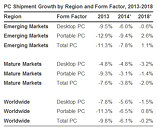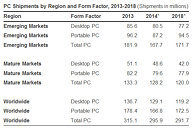Tuesday, March 4th 2014
IDC Expects PC Shipments to Fall by -6% in 2014 and Decline Through 2018
Worldwide PC shipments fell by -9.8% in 2013, slightly better than a projected decline of -10.1%, but still the most severe contraction on record, according to the International Data Corporation (IDC) Worldwide Quarterly PC Tracker. Fourth quarter results were slightly better than expected, but the outlook for emerging markets has deteriorated as competition from other devices and economic pressures mount. In mature regions, the fourth quarter was also slightly ahead of expectations, although the improvement seems driven by short-term factors like a slight rise in XP replacements and is not expected to last long.
Overall growth projections for 2014 were lowered by just over 2%, and subsequent years were lowered by less than 1%. However, the changes are enough to keep long-term growth just below zero, and push volumes below 300 million throughout the forecast rather than staying slightly above this level.Emerging regions were on forecast for the fourth quarter (finishing a dismal year with volume declining by -11.3%), but concerns about the impact of slower economic growth, the culmination of some large projects, and conservative expectations for factors like touch capability, migration off of Windows XP, as well as continued pressure from tablets and smartphones has further depressed expectations going forward.
"Emerging markets used to be a core driver of the PC market, as rising penetration among large populations boosted overall growth," said Loren Loverde, Vice President, Worldwide PC Trackers. "At the moment, however, we're seeing emerging regions more affected by a weak economic environment as well as significant shifts in technology buying priorities. We do expect these regions to recover in the medium term and perform better than mature regions, but growth is expected to stabilize near zero percent, rather than driving increasing volumes as we saw in the past."
"2014 will remain a challenging year for PC vendors in Asia as a cautious economic outlook means consumers will prioritize device purchases. At the same time, tectonic changes in politics will affect commercial spending in some of the major countries, like India, Indonesia, and Thailand, which are due to hold elections this year," said Handoko Andi, Research Manager for Client Devices, IDC Asia/Pacific. "The region is also seeing a void in public sector spending this year after huge education deals seen in India and Malaysia last year failed to materialize."
Overall growth projections for 2014 were lowered by just over 2%, and subsequent years were lowered by less than 1%. However, the changes are enough to keep long-term growth just below zero, and push volumes below 300 million throughout the forecast rather than staying slightly above this level.Emerging regions were on forecast for the fourth quarter (finishing a dismal year with volume declining by -11.3%), but concerns about the impact of slower economic growth, the culmination of some large projects, and conservative expectations for factors like touch capability, migration off of Windows XP, as well as continued pressure from tablets and smartphones has further depressed expectations going forward.
"Emerging markets used to be a core driver of the PC market, as rising penetration among large populations boosted overall growth," said Loren Loverde, Vice President, Worldwide PC Trackers. "At the moment, however, we're seeing emerging regions more affected by a weak economic environment as well as significant shifts in technology buying priorities. We do expect these regions to recover in the medium term and perform better than mature regions, but growth is expected to stabilize near zero percent, rather than driving increasing volumes as we saw in the past."
"2014 will remain a challenging year for PC vendors in Asia as a cautious economic outlook means consumers will prioritize device purchases. At the same time, tectonic changes in politics will affect commercial spending in some of the major countries, like India, Indonesia, and Thailand, which are due to hold elections this year," said Handoko Andi, Research Manager for Client Devices, IDC Asia/Pacific. "The region is also seeing a void in public sector spending this year after huge education deals seen in India and Malaysia last year failed to materialize."


6 Comments on IDC Expects PC Shipments to Fall by -6% in 2014 and Decline Through 2018
news.cnet.com/8301-10805_3-57619803-75/windows-xp-wont-die-without-a-fight/
Once XP is done, any and all flaws will be exploited. One winner in that might be a 3rd party that could keep up with patches/software to keep XP users "safe" We'll see and I digress.
In the meantime, IDC overestimated the decline in 2013, and probably will again in 2014.
It's about the fact that Intel has mostly stopped innovating in the absence of real competition in the x86 sphere.
What are the gains from going from SB to Haswell? On average 10%? Do you remember what was happening 10 years ago? A year or two passed and CPUs became <b>two</b> times faster, also RAM grew exponentially.
What do we have now? I bought a new SandyBridge PC three years ago. It still has the same configuration - the same CPU, the same RAM, the same HDD.
Is there any reason to upgrade? Zero.
What about even older PC? Anything with two CPU cores and two gigs of RAM will run Windows 8.1 happily. I.e. almost any PC for the past eight years.
So, Intel should blame themselves for slowing down the PC industry. Or, maybe just maybe, we've come to the point when PCs are good enough, thus there's no reason to upgrade.
PCs are blazingly fast, they run every business application we throw at them, and only gamers feel the need to upgrade their GPUs since graphics is getter better and better, requiring more GPU power.
so thats why selling chart of pc little slow down
its easier for tablet or phone since you cant ugrade for more. so people tend to buy a new phone than buy a new pc
and once more, today people dont need to buy pc or laptop for connecting to internet so they may not buy pc, like the other say that today mobile stuff has more power to do multi tasks and life style, where people prefer light and easy gadgets to do any task and they may not list buying pc at their first list